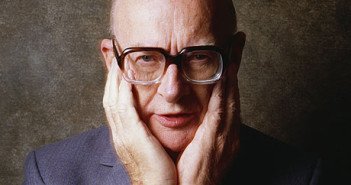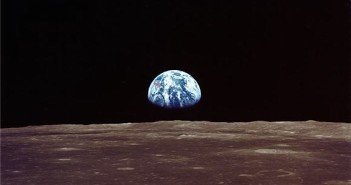Space | The Final Frontier for Historians
What’s a completely modern, contemporary, theme in history?
Try to think of a suitable answer: Politics? No. The Greeks. Technology? Well, some say that papyrus was a technology. Gender? Joan of Arc and Elizabeth 1 set those contemporary preconceptions on their heads.
And, as British columnist Peter Jones wrote recently, there was even a Donald J. Trump in ancient times: the successor to Pericles of Athens, Cleon, was a vulgar, blustering loudmouth who unfortunately turned out to be as good as his word.
But there is one area of human activity that is truly contemporary, which never existed before the 1950s. That’s the exploration of outer space. Copernicus might have developed his “revolutionary” theory, forgive the pun, in the 15th century, but up until recent decades the ideas about space were all theories. Nobody could go there.
Yet in 2016, on the death of musician and artist David Bowie, astronaut Chris Hadfield could recall how he phoned Bowie’s company from space, to ask if he could have the right to sing Space Oddity (they thought he was joking).
A current series at Dublin’s Irish Film Institute includes past ideas of space travel, through the prism of the directors’ lenses. There are a series of talks to go with the films, which overall look at how the future was envisioned by 20th century filmmakers. Various themes of futurism are being discussed, with the benefit of hindsight. So Fritz Lang’s classic Metropolis is the oldest film (1926), and Wall-E (2008) the most recent. Stanley Kubrick’s iconic 2001: A Space Odyssey, of course, gets an airing.
The term science fiction is not stressed, but generally the concept is to examine what we thought was going to happen, back in the day. No, that is not a technical explanation! Robots, world conflagrations – and colonisation of space – were the key ingredients in predictions of the development of human history.
And what did people think, back in the day, when the day was October 4, 1957, and the Russian satellite Sputnik was embarked on its first orbits of the earth? There was breathless excitement that night, as people all over the world gathered outdoors to see the blinking white light that was the first man-made object to escape the bonds of gravity. For the Russians, it was a magnificent achievement, with the looming sub-text of their technological superiority during the Cold War. And, as Elizabeth Howell writes in a space.com piece,
The program sent a shockwave through the American public. A new definition of time was created; this was the Space Age.
One year later, NASA, the National Aeronautics and Space Administration, was established. In 1962, President John Kennedy pledged that “we shall go to the moon, not because it is easy, but because it is hard”.
Now there was a race, not only between the then USSR and the USA, but between the imaginations of the great writers on space exploration – Arthur C. Clarke, Isaac Asimov, Robert A. Heinlein – and the engineers and scientists who were actually going there.

For kids of all ages in the 1960s, and for scientists of all stripes, the space race in the 1960s was an absorbing, exciting serial, with its chapters of Projects Mercury (1959-63), Gemini (1961-66) and Apollo (1961-72).
On July 21, 1969, two of the Apollo 11 astronauts landed on the moon, and the excitement which had been engendered by Sputnik only 12 years earlier was outstripped. People all over the world watched the blurry black and white television pictures in awe as Neil Armstrong and Buzz Aldrin lumbered around on moon dirt. Reactions ranged from the deeply poetic to the cheerily popular, as in this ditty from Bobby Dimple and the Lunar Ladies.
But after that, an element of “so what” effected the general population, although astronomers, physicists and ‘rocket scientist” maintained their joy.
For a while: the fatal explosions of Challenger in 1986 and Columbia in 2003 dimmed the excitement. They also helped give substance to the refrain of inquiries of why the superpowers were doing this, spending vast amounts on the uncertain prospects of space travel while back on earth millions starved, suffered illness due to lack of research and facilities, led their lives in illiteracy.
Attention turned to Mars, with the Pioneer and Mariner projects. One of the US Viking craft landed successfully on Mars, the red planet, in 1976.
Space in the movies was out-of-this-world
But without proper “colonisation” of the Moon or other planets, the public contented itself with the recurrent genre of space movies and series – 2001, the Star Trek franchise, Sunshine, Solaris, Moon. That this genre has reached new heights of quality – and popularity – in recnet years bears testimony to the ongoing fascination with the suspicion that someone or something is “out there”. Think of the success of Interstellar, Gravity, and The Martian at the box-office in the past few years.
In 1968, when 2001: A Space Odyssey was released, the Apollo programme was in full swing, and the attitude generally to exploration of the galaxy was positive. It was exciting, a massive concentration of human brainpower, ingenuity and endurance, “to boldly go”. In Kubrick’s vision, however, the journeys into other, infinite environments could end in dystopian situations, with artificial intelligence ruling in a not so benign way.
The history of space exploration has become increasingly a field for scientists and experts, who can understand as they chart the sophistication of the machinery and software – it’s a cliche now that the entire computer power of the space rocket that lifted the Apollo astronauts could now be found in an iPhone – or more specifically, according to Tibi Puiu, “the iPhone 6’s clock is 32,600 times faster than the best Apollo era computers and could perform instructions 120,000,000 times faster”.
Space is a show that will run and run. And it is history that is being made right now, with even important Irish presences in development of communications for astronauts, and muscle stimulators to keep them fit in the gravity-less environment.
At the present, the dominance of space by telecommunications satellites is a major issue. Power from the skies has a new meaning, as discussed in Space Wars, Space Peace, a recent documentary from the BBC in the Analysis series.
But in more ways than one, mankind and history have come, and gone, a long way in just under 50 years.

Sources:
Chris Bowlby, Analysis, Radio 4
We choose to go to the moon – Youtube.
NASA
Wikipedia, space.com, sci-filondon.com,zmescience.com, ifi.ie
